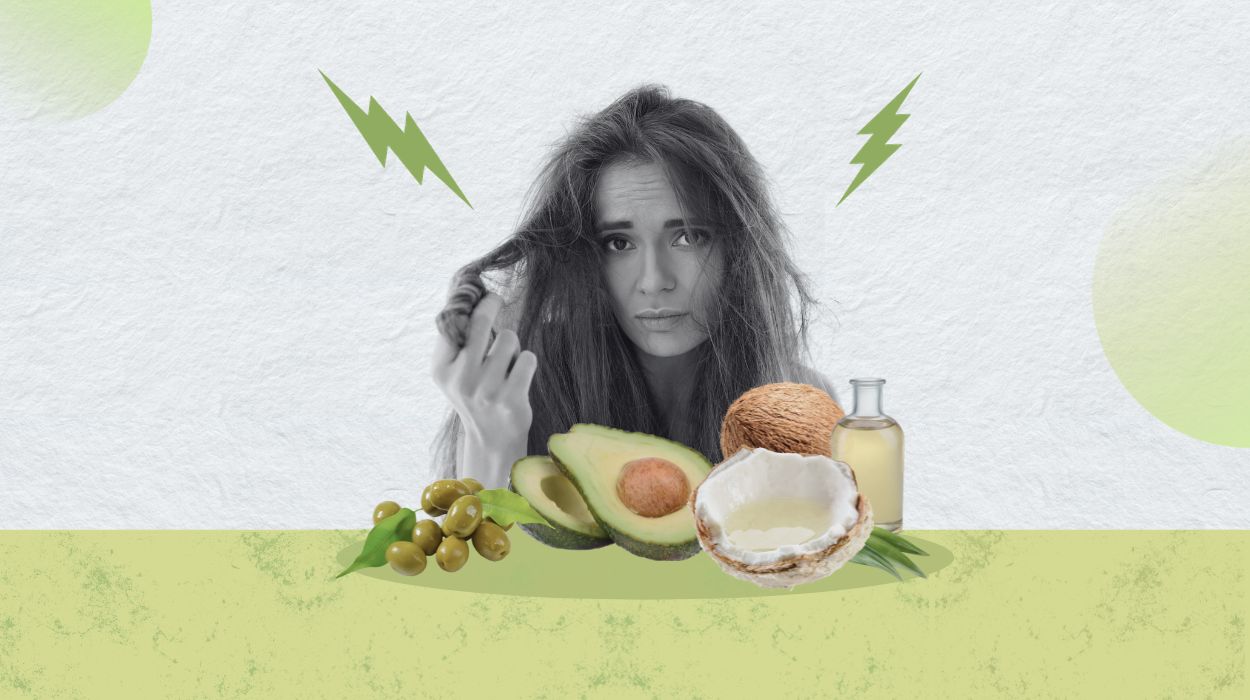 Expert's opinion
Expert's opinion
Expert's opinion
The article is a subjective view on this topic written by writers specializing in medical writing.
It may reflect on a personal journey surrounding struggles with an illness or medical condition, involve product comparisons, diet considerations, or other health-related opinions.
Although the view is entirely that of the writer, it is based on academic experiences and scientific research they have conducted; it is fact-checked by a team of degreed medical experts, and validated by sources attached to the article.
The numbers in parenthesis (1,2,3) will take you to clickable links to related scientific papers.
How To Get Rid Of Frizzy Hair: Remedies & Preventions In 2024

The battle against frizz can feel like a never-ending saga. It’s rough, lacks luster, and is usually full of split ends. Even trying to straighten hair becomes a nightmare, especially if you have thick or curly hair. So how to get rid of frizzy hair?
Luckily, there is a way to get rid of it. Since it’s caused by issues with moisture and hair cuticles, you can try homemade deep moisturizing techniques. While a haircut might give you a quick and temporary solution, this article gives you eight ways to get long-term relief.
8 Ways To Get Rid Of Frizzy Hair
You can reduce frizzy hair by using natural remedies rich in essential nutrients in your hair care routine. These remedies include everyday household items such as:
- Apple cider vinegar.
- Olive oil.
- Coconut oil.
- Argan oil.
- Honey.
- Avocado.
- Aloe vera.
- Egg yolk.
How To Get Rid Of Frizzy Hair
Here are our top tips on how to get rid of frizzy hair permanently at home. You can use everyday household products to promote healthy hair growth. Some of these remedies will teach you how to get rid of frizzy hair in 5 minutes.
Apple Cider Vinegar
Apple cider vinegar is a multipurpose home remedy with numerous hair health benefits. It can reduce frizz by restoring the optimal pH of the scalp and hair strands.[1]
Healthy hair has an acidic pH of about 5,[1] which keeps the cuticle layer adequately sealed. Alkalinity damages the cuticle and causes hair breakage by increasing the negative electrical charge[2] between hair fibers, causing friction.
According to research, apple cider vinegar has antifungal and antibacterial[3] properties that protect hair health. Check out this article on how to make an apple cider vinegar rinse at home.
Olive Oil
Olive oil has traditionally been used to hydrate hair, relieve itchiness, restore strength and shine, and prevent split ends.
Olive oil is commonly used in hair products such as shampoos and conditioners. It’s abundant in vitamins A, D, E, and K, as well as omega-9 fatty acids.
It also contains approximately 14.35 milligrams[4] of vitamin E, an antioxidant that effectively combats toxins in the hair.
Additionally, olive oil contains calcium, which aids the hormone and enzyme secretions involved in healthy hair growth. Here are some recipes for homemade olive oil masks.
Coconut Oil
Coconut oil, unlike most hair care products, is safe and beneficial for all hair types.
Its most popular advantages include removing dandruff, preventing styling damage, restoring luster, and taming frizz.[5] It also reduces protein loss in both damaged and undamaged hair.
Coconut oil has a high affinity for hair proteins and helps moisturize hair, especially when used with hair masks. Additionally, because of its chemical makeup and structure, it can easily penetrate the hair shaft.
Check out all the different ways you can create a coconut oil hair mask at home.
Argan Oil
Argan oil is a powerful moisturizer that contains the fatty acids oleic and linoleic acid. Researchers discovered it leaves oil traces on hair after washing, improving elasticity and luster.
Argan oil is also high in antioxidants like vitamin E, which fight oxidative stress[6] and prevent hair damage. It has also been shown to be effective in preventing protein loss.
Argan oil’s essential fatty acids and vitamin E also help to increase hair elasticity and restore shine. Try this argan oil hair mask to help strengthen your hair.
Honey
Organic honey is an excellent hair conditioner because it’s high in vitamins, minerals, amino acids, and antioxidants, which nourish and protect hair from damage.
Honey is an effective moisturizer that coats the hair, smoothing it and keeping the cuticles closed. It has a thick, smooth texture that prevents frizz by drawing moisture into the hair[7] and keeping it hydrated.
Honey gives hair a healthy, shiny appearance and makes it easier to comb. Plus, it has small amounts of protein, which strengthens hair when combined with the other components of honey.
You can use a variety of ingredients and apply this honey hair mask once a week or so.
Avocado
Avocado oil nourishes the hair with fatty acids and locks in moisture. It absorbs quickly into the hair, taming frizz and making it shine.
Avocado contains vitamins A and E, powerful antioxidants protecting hair from toxins. It also has 2 grams[8] of protein, which aids in the regeneration of hair cells. It even has particular amino acids and protein-building blocks that naturally strengthen hair.
Try this avocado hair mask to add moisture to your hair and scalp.
Aloe Vera
Aloe Vera is full of minerals and vitamins that promote hair health. This includes vitamins A, B12, C, and E, which work at the follicle level.
An aloe vera hair mask can help to restore the pH of the hair, which seals the cuticle layer. It also improves hair shine and gives it a more vibrant appearance. Naturally, this will make combing easier and increase moisture retention. It’s also been used to treat inflammation and itchiness on the scalp.
According to some studies, it even protects hair from UV damage,[9] preserving shine, color, and texture and preventing breakage.
Eggs
Vitamins found in egg yolks support healthy hair and protect it from damage. It can hydrate dry hair and nourish emerging hair strands to strengthen them. They also contain saturated fats, biotin, and other vitamins associated with hair health.
Applying eggs topically, like with an egg hair mask, or ingesting it can provide essential nutrients for hair health, resulting in shinier, frizz-free hair.
Why Is Your Hair So Frizzy?
Hair frizz mostly happens because of a lack of moisture. Of course, many factors affect your hair’s moisture, including:
- Humidity — causes dry hair fibers to expand to let in moisture.
- Hot water or overwashing — strips hair of its natural oils, making it dry.
- Heat styling — heat tools can damage the hair cuticle, causing frizz.
- Towel-drying — friction can roughen up the cuticle.
- Harsh hair products — cause hair damage and exacerbate frizz.
- Dry and damaged hair — becomes more porous and absorbs moisture more easily.
The keratin cuticle, keratin protein, cortex, and medulla are the layers that make up your hair. A change in any of your layers affects the overall appearance of your hair. The cuticle layer must remain intact to keep moisture in the shaft longer, preventing frizzy hair.
How To Get Rid Of Frizzy Hair Fast: Helpful Tips
You have many options when deciding how to get rid of frizzy, curly hair. However, your best chance at eliminating frizz lies in your daily hair care routine. Here are some tips:
Rinse Your Hair With Cold Water
It’s important to remember that heat is a common cause of frizzy hair and dry skin. Hot water strips moisture and hair’s natural oils, leaving it dry and prone to breakage. It can also cause inflammation and weaken hair roots.
A cold rinse seals the cuticles of your wet hair, preventing frizz. Plus, cold water improves scalp texture, shine, and blood circulation. If you can’t use cold water, rinse your hair with room-temperature water.
Choose The Right Hair Products
Frizzy hair is also caused by friction. Using the right hair products can help you avoid frizz in the following ways:
Avoid A Fine Bristle Hairbrush
This is an important tip on how to get rid of frizzy hair for men and women — avoid hairbrushes with fine bristles. Fine bristle brushes might achieve straight hair faster but it irritates the hair cuticles, causing breakage and split ends. Use wide tooth combs instead.
Avoid Cloth Towels
The friction caused by cloth towels exacerbates frizzy hair. One of our biggest tips on how to reduce frizzy hair is letting your hair air dry or using microfiber towels.
Use Ionic Hair Dryers
Typical dryers can overheat your wet hair, causing it to lose moisture and frizz. Ionic hair dryers shatter water into micro-sized particles that easily penetrate the hair shaft, improving hydration. With the help of a hair mask, negative ions seal and flatten the hair’s cuticles, trapping moisture.
Avoid Consecutive Washing
Overwashing removes moisture and essential oils from the scalp and raises the hair cuticles, which results in frizz.
Trim Your Hair Regularly
A trim every two to three months can go a long way toward reducing frizz. It helps get rid of flyaways and dead ends that can cause friction — which might create even more frizz.
Conclusion
Changing your daily hair care routine is going to give you the biggest chance of permanently getting rid of frizz.
You’ll want to stop overwashing, use wide tooth combs, avoid heat and styling products, and apply hydrating masks weekly. Household products like olive oil, coconut oil, honey, aloe vera, argan oil, avocado, and egg yolk are great for homemade masks.
With all-natural ingredients, time, and patience, you can work towards reducing your frizz long-term.
+ 9 sources
Health Canal avoids using tertiary references. We have strict sourcing guidelines and rely on peer-reviewed studies, academic researches from medical associations and institutions. To ensure the accuracy of articles in Health Canal, you can read more about the editorial process here
- Rizg, W.Y., Hosny, K.M., Elgebaly, S.S., Alamoudi, A.J., Raed Felimban, Tayeb, H.H., Alharbi, M.G., Bukhary, H.A., Abualsunun, W.A., Almehmady, A.M. and Khallaf, R.A. (2021). Preparation and Optimization of Garlic Oil/Apple Cider Vinegar Nanoemulsion Loaded with Minoxidil to Treat Alopecia. Pharmaceutics, [online] 13(12), pp.2150–2150. doi:https://doi.org/10.3390/pharmaceutics13122150.
- Maria Inês Dias, Andréia de Almeida, Patrícia Cecato, André Ricardo Adriano and Pichler, J. (2014). The shampoo pH can affect the hair: Myth or Reality? International Journal of Trichology, [online] 6(3), pp.95–95. doi:https://doi.org/10.4103/0974-7753.139078.
- Kara, M.A., Amine Assouguem, Al, M., Safaâ $Other$Other Benmessaoud, Hamada Imtara, Hamza Mechchate, Hano, C., Abdou Rachid Zerhouni and J. Bahhou (2021). The Impact of Apple Variety and the Production Methods on the Antibacterial Activity of Vinegar Samples. Molecules, [online] 26(18), pp.5437–5437. doi:https://doi.org/10.3390/molecules26185437.
- Usda.gov. (2023). FoodData Central. [online] Available at: https://fdc.nal.usda.gov/fdc-app.html#/food-details/1103861/nutrients
- Flavia Scigliano Dabbur, Hédla, G., Rosana Maia Costa and Renalva, J. (2019). Development, physicochemical and functional analysis of anti-frizz leave-on emulsion with coconut oil. [online] ResearchGate. Available at: https://www.researchgate.net/publication/338907943_Development_physicochemical_and_functional_analysis_of_anti-frizz_leave-on_emulsion_with_coconut_oil
- Sharifi, N., Sanaz Hamedeyazdan, Javad Shokri and Farnaz Monajjemzadeh (2022). Argan oil as a pretreatment of human hair before exposure to oxidative damage: Attenuated total reflectance and protein loss studies. Journal of Cosmetic Dermatology, [online] 21(10), pp.5010–5017. doi:https://doi.org/10.1111/jocd.14885.
- Hadi, H., Omar, S. and Ammar Awadh (2016). Honey, a Gift from Nature to Health and Beauty: A Review. [online] ResearchGate. Available at: https://www.researchgate.net/publication/310435905_Honey_a_Gift_from_Nature_to_Health_and_Beauty_A_Review.
- Usda.gov. (2023). FoodData Central. [online] Available at: https://fdc.nal.usda.gov/fdc-app.html#/food-details/171705/nutrients
- Chelu, M., Adina Magdalena Musuc, Ludmila Aricov, Emma Adriana Ozon, Andreea Iosageanu, Stefan, L.M., Ana-Maria Prelipcean, Popa, M. and Jose Calderon Moreno (2023). Antibacterial Aloe vera Based Biocompatible Hydrogel for Use in Dermatological Applications. International Journal of Molecular Sciences, [online] 24(4), pp.3893–3893. doi:https://doi.org/10.3390/ijms24043893.



